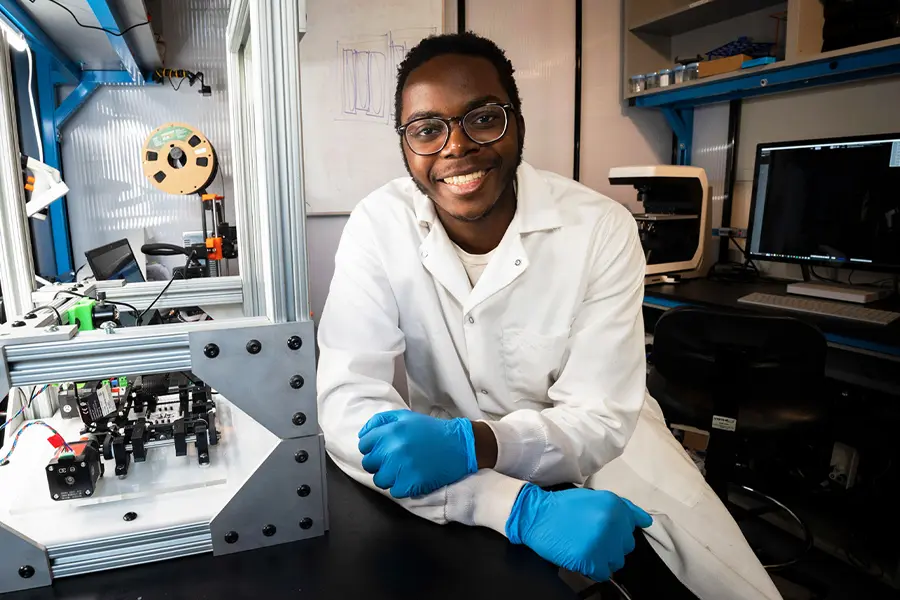
CMU Mechanical Engineering Student Works on Tiny Bio Robots
Lameck Beni wants to use his training for medical devices
By Kim Lyons
Carnegie Mellon University student Lameck Beni wants to create things that can help people.
The recipient of a Summer Undergraduate Research Fellowship (SURF), Lameck — a College of Engineering rising senior with a double major in mechanical engineering and biomedical engineering — received hands-on experience in an engineering lab working on research that may ultimately lead to the creation of small-scale biodegradable robots.
“The biggest takeaway I guess would be a lot of the freedom that you get,” he says. “My thesis mentor made a great effort to not hold my hand when it came to approaching my project. Learning to think more creatively and learning to think as an engineer has definitely been helpful.”
Victoria Webster-Wood, an assistant professor of mechanical engineering and biomedical engineering in the College of Engineering, supervised Lameck’s work. She says the undergraduate research training process should include teaching some of the independent researcher skills that graduate students have already had a chance to practice.
“Building those skills takes time, so I really like to get undergrads involved in the lab early, and then try to convince them to keep coming back,” Webster-Wood says. “By the time they're seniors, they're functioning at the level of my early grad students. And it makes them really competitive if they decide to go to grad school.”
The goal of Webster-Wood’s research is to create what she describes as completely biocompatible and biodegradable autonomous robots.
“I could see them translating into self-actuating stents or drug-delivery robots that travel through blood vessels or through the esophagus,” she says.
Such small robots could also be released in swarms to help conduct research in ocean environments or to monitor water quality and wouldn’t have to be retrieved since they’re biodegradable.
“I think it’s really interesting that a lot of what we’re learning is going to be useful. It’s really nice to know that your time is so well spent.”
Lameck Beni, College of Engineering, Class of 2024
Summer Undergraduate Research Fellowship (SURF) recipient
Lameck’s work involved testing and validating a bioreactor that would allow the group to assess what effect stretching muscles during growth has on how strong those muscles become. He was tasked with determining the position of the fixtures the muscles would be attached to and how to control them, so they moved the way the team wanted them to move.
As part of the work to create biodegradable robots, Lameck learned to make what are called phantoms, which are like analogues for muscle tissue. So rather than growing muscle and trying to stretch meshes with actual muscle on them, Lameck was fabricating meshes out of silicon, with little fake silicon muscles, to try to compare how the meshes deformed when they’re stretched to a computational model the lab had created.
Prior to receiving a SURF award, Lameck worked with his Ph.D. student mentor Saul Schaffer. As a result of this work, Lameck was a co-author on a published research paper.
A native of Harrisburg, Pennsylvania, Lameck says when he was deciding where to attend college, he had an impression of CMU as a challenging school, but liked the idea of being able to do research as an undergraduate.
“I didn’t really know what undergrad research looked like before I came here,” he says.
But he found it manageable, especially with the encouragement of fellow students who motivated him to work hard.
“In engineering it’s nice to have like-minded peers. People who are in the same situation as you, who want to achieve great things,” he says.
Lameck has embraced the opportunity to take classes outside his area of expertise including history and psychology. In addition to his course work, Lameck is a peer mentor for CMU’s Student Academic Success Center and is a residential assistant at one of the dorms for first-year students.
Lameck says he’s still debating whether he wants to attend graduate school, but he added that having research experience as an undergraduate is great to have under his belt. He does know that he wants to go into the biomedical devices field to create things that will help people with disabilities.
“I think it’s really interesting that a lot of what we’re learning is going to be useful,” Lameck says. “It’s really nice to know that your time is so well spent.”